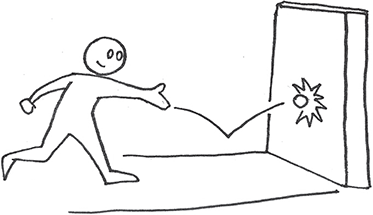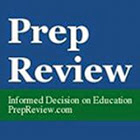Boarding School Interview

As today is my birthday, and I've just turned twenty, my mother seems to have devoted the day to sentimental nostalgia, which is fair enough. She wrote me an email outlining the various stages of my childhood, from the weather on my first birthday to a description of how my personal disposition has changed since then. In the email, she tells a number of stories, one of which I find relevant to the interview process. This holds true not only for Prep School interviews, but college interviews, job interviews, and just about any conversation you will have with someone that you are trying to impress.
As a young child, I was mystified by the world, wanting to learn why and how everything worked. We didn't have a television and as my brother was nearly five years older than me, I was very much left to entertain myself. I'm told in my mother's email (and very vaguely recall) that a simple bouncy ball consumed weeks of my life. My mother writes: "You spent hours with a super ball learning where it went when it bounced off the wall and throughout the room! Developing that strategy and analytical thinking that you have today."
This is not to say that you should should spend the final hours before your interview throwing rubber objects off the surrounding walls. It is to say, however, that every time you make a comment in an interview, you are effectively throwing a super ball at the interviewer and there are a number of different directions in which it can bounce back. Ultimately, the only way to accurately predict how your interviewer will respond is to practice. And even then, the ball may take a weird bounce between when the question leaves your mouth and the response comes back at you. The only way to be prepared for these 'odd bounces' is to practice thinking flexibly, and to go into the interview with an open-mind. Talk to your family, set up a mock interview with your favorite teacher, read the news (sometimes), and most importantly, converse with your peers about your interests and opinions. Admissions officers spend so much time talking to young, nervous teenagers that they speak your language fluently. Often, the best preparation for an interview is just talking to your peers every day.
The interview process is very similar to the personal statement in that Prep Schools are trying to figure out who you are and what makes you different. First, I would recommend scheduling your reach schools, which will likely include your favorite options, for last, so that you may practice interviewing a few times to build confidence.
Think of some questions you will likely be asked. Think of which direction the ball will bounce off the wall. Keep in mind that the interview will center around you and your interests. Your greatest strength, therefore, will be the ability to speak enthusiastically and knowledgeably about your interests and why you are interested in those particular topics/activities/departments. How do you practice this? Practice meeting people. An interview is just like a first conversation you have with someone you've never met before. So go out to dinner with your parents and their friends for once, and practice meeting people who are older than you. Practice answering their small talk questions: "what do you study; what do you do in your free time; who is your role model and why?"
Like your personal statement, you will want your conversation to stand out. You will be one of many interviewees on a particular day. The best possible result will be if at the end of the day, your interviewer is still thinking about you instead of all the other candidates. Be the yellow umbrella.
Be fluid and flexible. In my St. Paul's interview, of which I remember very little, I spent a majority of my time talking about wrestling. Yes, the sport of wrestling. Have I ever wrestled? No. Did I have any interest at all in wrestling? No. So why did I spend thirty very important minutes talking about wrestling? Because my interviewer was the boys junior varsity wrestling coach, and after talking about me for a while, I thought it would be good to talk about him for a while. The most successful interviews transition from question and answers into conversations. Do not be afraid to ask the interviewer a few questions, or to talk about something you don't know that much about. You don't have to be perfect, just enthusiastic and interested (as well as interesting).
The morning of my interview, I had decided to wear contact lenses for the first time instead of glasses. I put them in right before my interview, not realizing that my eyes would water for the following ten minutes as they began to adjust. In other words, it appeared as though I was crying for the first ten minutes of my interview. When the interviewer spoke with my parents (which most Prep Schools will do), my parents mentioned it was my first day wearing contacts, and that became a good conversation piece. The following year, as a student when I ran into my interviewer, we had a laugh about the matter as well as the fact I had no interest in wrestling.
To summarize the previous two posts, the personal statement and interview offer you two opportunities to be the yellow umbrella. Be yourself, but be different, interested, and interesting. Give the admissions team something to think about, something to remember you by, and most importantly, make them want to meet you and speak with you again. When I applied to colleges, my father gave me a good piece of advice: the primary purpose of any personal statement or essay is to make whomever is reading it intrigued enough to want to speak with you. Ultimately, if you succeed in this, the only way they can do so is to move you along the admissions process. And if they do that, you are on your way to a successful application!
Nitpicking details (Interview edition)
What do I wear: I've never thought this to be particularly important. Dress well; think, Sunday church service or business-casual dinner party. Interviewers will not be swayed by what you wear unless they really notice your clothes--no ripped jeans, flip-flops etc. General rule: look up the school's dress-code and follow it when you attend interview.
Interview Order: You will be nervous for your first interview, no matter where it is. For this reason, I would suggest placing your highest priority schools toward the end of your list, and perhaps one or two of your probable schools at the beginning for practice. That said, after one or two, you should be confident, and each school interviews slightly differently, so no two interviews will be the same.
Where do students stumble: I've never been in a Prep School interview other than my own, so I'm not entirely sure. That said, you will get some odd questions. Examples include "what is your spirit animal; what is your favorite color; if you could meet any figure in history, who would it be and why?" There is no correct answer to any of these questions; just pick something and come up with an interesting explanation.
Should I ask a question at the end?: You shouldn't feel as though you have to ask a question, although you will probably be asked if you have any questions. You may want to prepare one before the interview or a question may come up during your interview from something you or your interview has said. I answered something along the lines: "I had a number, but I think my tour guide managed to answer all of them. And I have his email if any further questions come up."
How formal should my responses be?: There is no way to answer this without meeting your interviewer. In general, gauge your interviewer's formality, and respond in similar style.
Should I pay attention during my tour?: Yes, for two reasons. Most schools will have you tour before you interview, meaning that if you haven't done much research on a school, you have the chance to learn a lot about it from a current student before you interview. Use this opportunity. Ask your tour-guide as many questions about the school as you can; this will help you demonstrate in your interview how much you know about the school, and will make it easier for your interviewer to envision you as a part of the community already. Many tours are 1-on-1 or 2-on-1; use this time to ask any questions you have and even to befriend your guide. Funny enough, there's a chance you might see your tour guides from other schools later on during sports games or in college. I'm still good friends with a couple tour guides from schools I didn't end up at. Finally, some schools have tour-guide feedback, meaning that your guide may have a chance to write a brief note (that ends up in your file) about how they think you would fit in. Some admissions offices value this kind of student opinion.
Any other questions? Just comment below.
Image credit: Super Ball
Copyright: Safari Books Online

